Her Family
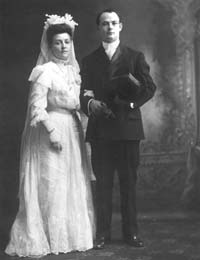 Joséphine Gariépy and Rosario Côté
Joséphine Gariépy and Rosario CôtéGilberte was born into a Catholic family to Rosario Côté and Joséphine Gariépy. Joséphine was a pure woman who learned about marital obligations only at the time of her engagement to Rosario. She retained an endearing naivete all her life. In the 1950's, seeing women so immodestly attired, she told her daughter, Gilberte: “These bad styles will lead us to great sufferings.” When we see the near destruction of the family, divorce, suicide, abortion, etc., we can see that her prediction from many years ago has been realized. If like Mrs. Côté, women had preserved their sense of modesty and their purity by dressing decently, these great misfortunes might have been avoided.
It was to protect her virtue that Rosario Côté abstained from keeping company with his future wife during the four years preceding their marriage: “I will come back only when I am ready to marry”. They were wed at the ages of 26 and 25 on June 26, 1907 in the Church of the Immaculate Conception in Montreal.
The Good Lord gave them a first born son whom they named Jean-Baptiste. Although healthy at birth, he began to become weak and lose weight. The doctor could not understand it. Mrs. Côté had a devotion to St. Joseph and brought her son to St. Joseph's Oratory to consult with Brother Andre (now Saint Andre, canonized on October 17, 2010). Brother Andre did not cure Jean-Baptiste; instead he recommended Mrs. Côté offer her first born to God. It was a big sacrifice for the young mother and the next week the little boy passed away.
Was this a sacrifice asked by God so that little Jean-Baptiste's mother could pursue a special mission? We are certain that nothing is a coincidence in the Divine Plan. (Incidentally, Mrs. Côté-Mercier's funeral was on the feast day of St. Jean Baptiste.)
Joséphine Gariepy had a knee ailment. One day she attended confession at the Marian shrine at Cap de la Madeleine, with Father Frederic administering the Sacrament. (Fr. Frederic was beatified by John Paul II in 1988.) She complained that her handicap prevented her from going to morning Masses. She was encouraged to continue going to Mass and indeed she experienced a healing.
Birth, Baptism, Childhood
 Gilberte at 9 months
Gilberte at 9 monthsMarie Joséphine Gilberte Côté was born in the month of Mary on May 25, 1910 (which was the birth date of Saint Padre Pio, canonized June 16, 2002). She left this earth on the octave of the canonization of the holy padre, June 21, 2002. Gilberte Côté had the same resolve as did Padre Pio when it came to scourging wrongs and condemning immodesty and injustice.
She was baptized in the Church of the Immaculate Conception in Montreal, Canada. Mary Immaculate was her patroness and protector. In 1970, when the first Pilgrims of Saint Michael were consecrating themselves to Mary, according to the spirituality of Saint Louis Marie de Montfort, Gilberte Côté was given the name “Gilberte of the Immaculate” (When someone was consecrated to Mary they took the name of the patron of the church where they were baptized.)
In 1910, at the time of Gilberte Côté's baptism, Louis Even was a teacher in this same parish of the Immaculate Conception. God was preparing the future.
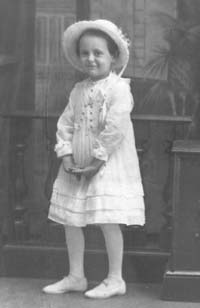 Gilberte at age 6
Gilberte at age 6Gilberte had a second brother, Rosaire who was a great supporter and friend of the movement during his entire life. Rosaire passed away in 1963 at 51 years of age. He had one son, Michel, born in 1939, the year in which VERS DEMAIN was launched. Aunt Gilberte was Michel's godmother and the lad had great respect for her. He was and continues to be a great supporter of the work of MICHAEL.
Gilberte began studying the piano at the age of 4 and had a good deal of musical talent.
At age 6 she would put little stones in her shoes as a sacrifice in order to help save souls.
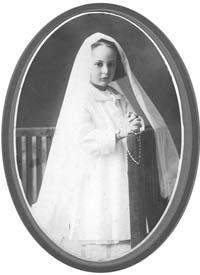 At her First Communion
At her First CommunionFrom the 1st to the 7th grades, Gilberte was taught in the parish of St. Stanislas de Koska by the Sisters of Jesus and Mary, founded by Blessed Marie-Rose Durocher. From the 8th to the 10th grades, she was taught by the sisters of the Congregation of Notre Dame at Mont Ste. Marie.
When she finished her studies at Mont Ste. Marie, the teacher asked: “Will you have the courage to abandon your studies, Gilberte?” These words were asked to her father who promptly went to Marguerite Bourgeois College to pay for her future education. Few fathers of families could afford such an expense.
So Gilberte attended Marguerite Bourgeoys College, founded by Sister Saint Anne-Marie in 1908. The college had opened its doors to higher education for young women who took university courses at the college and were granted degrees by the University of Montreal. Gilberte graduated with a Bachelor of Arts degree and earned a graduate degree in Philosophy and Literature. For 6 years she took courses in Politics and Social Sciences at the University of Montreal. At that time, this was a tremendous education for a young woman. Before 1908, women did not attend university as their primary role was in the home as wife and mother. (Women who studied to be teachers and nurses received their training in regular schools and in hospitals, under the direction of the religious orders.)
Gilberte stood at the top of her classes. We, who lived with her as Pilgrims of St. Michael, are able to confirm the high calibre of her intelligence, talents and virtues.
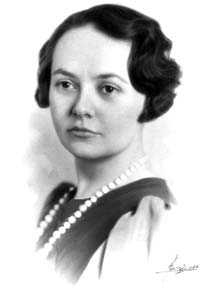
In Rhetoric, Gilberte Côté was honoured with a medal by the Minister of Foreign Affairs from France.
She also earned credentials in Music from Dr. Robert Schmitz's Music School in Chicago. She would have made music her career if she had not feared losing her soul in the worldly limelight.
Her father offered Gilberte a baby grand piano signed by a great artist. It would have been a treasure to her, but, in order to devote her time to the movement for monetary reform, she sacrificed her love for the piano and it sat mostly silent. On Christmas and on New Year's Day she regaled us with a few numbers. Even at Christmas 2001, the year before she passed, she gave us this small pleasure.
Gilberte Côté and her study companion, Eliane Lefebvre, were invited to compete against the boys in an oral debate at the University of Montreal. Gerard Fillion, who would later become director of the newspaper, Le Devoir, was one of the participants in the debate. The young ladies had prepared themselves well and defeated the boys. In those days it was a humiliation to be beaten by girls especially as it had only been a few years since girls were accepted at the university.
 University student
University studentMr. Rosario Côté attended the oral debate. He was proud of his daughter, but did not compliment her so as not to awaken pride in her. He contented himself with saying: “It took a lot of work to arrive at this victory!” Gilberte appreciated her father's prudence recognizing he wanted her to excel in character.
When she was 20, her father offered her a trip to Europe. She declined and asked him instead to make her a gift of the Theological Works of Saint Thomas Aquinas.
Her life was guided by St. Thomas' teaching. She took to heart that 'The perfection of wisdom is not in the intellectual line but in the line of love.' Her understanding was that: 'I will go to hell with my intellectual baggage if I do not use it to serve others.'
On the occasion of a reunion at her alma mater, friends asked if the echelons in heaven were higher for the cultivated than for others. Gilberte repeated St. Thomas' teaching, not only chilling the conversation but causing the applause of the nuns working in the kitchen.
Mr. Rosario Côté was a shoe manufacturer. At the beginning of the Depression in 1930 he said to his wife: “I barely make a penny per pair of shoes. I should lay off some employees, but I cannot do it; they have to, like me, assure the daily bread of their families.”
Like all businessmen, Mr. Côté was approached by the bankers. He said to his wife: “I do not understand what the bankers want from us; there is something crooked in it.” Gilberte Côté remarked later: “If my father had lived he would have understood Social Credit and he would have helped us. He could already see that there was something crooked about the banking system.”
Suddenly there was a bereavement. Her good father died suddenly on November 25, 1932 when Gilberte was 22 years of age. Her mother was inconsolable and Gilberte was obliged to make the funeral arrangements. “It was at this moment that I understood what it was to have a father who took on all responsibilities and on whom we could lean.”
Two years later, Mr. Côté's brother, an associate in the shoe factory, had borrowed money from the bank, and was forced to file for bankruptcy. Fortunately, Mrs. Rosario Côté's share in the business was protected and she invested her financial resources in the purchase of apartment buildings. Gilberte would collect the tenants' rents each month during the Depression years. She often had to return to the tenants several times to secure the their rent payments and this experience crushed her heart. She would say to herself: “I have taken the bread from their mouths. The $5 burned my hands.” What a dilemma, for if she had not collected rents the properties would be lost to the bankers and the poor would be without roofs over their heads.
Gilberte met Father Alexandre Dugré, a Jesuit priest, who was providing help to the many men out of work during these years. He was sending them to Abitibi to build the population in the area. Taking to heart the salvation of the poor, Gilberte Côté offered to help Father Dugré. Her mission was to gather funds to send the wives to join their husbands in that remote region. However, the wives wrote to her, “Our situation is worse in Abitibi than in Montreal. In Montreal, we were in misery, but here, we are starving.” Miss Côté stopped aiding in this effort.
But, how was she to aid the poor who were becoming more numerous? Unlike today, there were no pensions for seniors, no family allowances, no welfare and no benefits for the unemployment. For those who did not have farms, there was abject poverty.
One evening she attended a meeting of landlords in Montreal where there was much lamenting that rents were not being paid. One member of the group, Mrs. Louart, presented a very interesting proposition to the others. She invited Gilberte Côté to her home and explained Social Credit to her. Gilberte brimmed with enthusiasm. Here was what she had been seeking: the solution to the problem of poverty! She understood the problem was an artificial one. After all, food was produced in abundance in Canada, as in other countries. Stores and warehouses overflowed with goods, even in the hardest years of the Depression. But there was an outdated system of distributing goods caused by the bankers' debt-money system!
The bankers owned the money system. They created money out of thin air and lent it to governments, businesses and individuals with interest. Everyone thus became indebted. When banks decided not to lend further, the volume of money in circulation was restricted, causing economic havoc, such as bankruptcies, and unemployment. Gilberte understood that this was the worst swindle of all time! People were starving at a time when products were abundant, and this abundance was made by the very people who could not access it because money was not available to them. Was there anything more illogical, barbaric and inhumane!
Miss Côté studied the subject further in I. A. Caldwell's book, Money, what is it?. In December, 1936 she was invited to lecture at a conference on the principles of Social Credit. The lecture was appreciated by participants and newspapers gave her favourable reviews.
Miss Gilberte Côté was invited to a a meeting held by Louis Even in Montreal's east end in February, 1937. She attended with her mother, Mrs. Rosario Côté and her brother, Rosaire Côté. They were delighted to hear Louis Even explain a logical solution to the economic crises that had been raging for 8 long years and was the source of so much misery. All three family members, each in their own way, became great supporters of Louis Even.
Gilberte Côté told herself and repeated it often to us: “I went to university to enlighten my mind with the light of great men and to find the solutions to the problems of the time, and I found nothing. When I heard Louis Even, I said to myself: `Here is a teacher'!”
Even during her university studies, Marxist ideas were beginning to infiltrate both professors and students alike. Gilberte Côté did not let herself be caught up in Marxist ideology. On the contrary, she had a clarity and resistance to communism born in her Catholic faith.
At 26 years of age, with many other options, Gilberte Côté left the world of music and science to follow a path of service for the love of the poor as she advanced the principles of Social Credit with Louis Even and others.
Mrs. Rosario Côté invited Louis Even to present lectures on Social Credit at her home on St. Joseph's Boulevard in Montreal. The first two meetings took place in March, 1937. Priests, lawyers, doctors and other professionals were invited with 75 people attending each of the sessions.
Louis Even's meetings began with the Rosary. He proceeded to explain Social Credit in a way that made it comprehensible. From then forward, Louis Even enjoyed the full support of the Côté family.
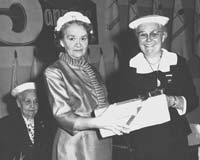 Juliette Lavigne and Gilberte Côté-Mercier at the 1965 Congress in Drummondville, PQ. Mrs. Rosario Côté is seated in the photo
Juliette Lavigne and Gilberte Côté-Mercier at the 1965 Congress in Drummondville, PQ. Mrs. Rosario Côté is seated in the photo In January, 1938, Louis Even had family commitments (a wife and four children) but placed his family and himself in the hands of Providence. Thanks to the charity of Mrs. Côté, he left his job as Supervisor at the Garden City Press Printing Company in Ste. Anne de Bellevue. He began to travel across the country teaching Social Credit, begging for his meals and for a bed in the homes of families he met. During these times, neither he nor his family lacked for anything.
Mrs. Côté rented a house for the summer in Labelle County. Here began the Côté family's apostolate work with Louis Even. Their goal? To free the poor from their misery.
During the day, Gilberte Côté, accompanied by Juliette Lavigne, scouted for venues to host meetings; these were announced on flyers and distributed door to door. The speakers were well received with packed halls in many communities, including in Ferme Neuve and Mont St. Michel.
In Mont Laurier it was another matter. Miss Côté organized a meeting, announcements were prepared and distributed in the small town for a meeting that evening. Certain politicians bribed the landlord of the meeting hall who withdrew its availability. Without skipping a beat she retained another venue and announced a meeting. The politicians intervened and the owner refused to allow the meeting in his hall. This happened 5 times in 1 day! In the end, the meeting was held on the porch of the blacksmith's shop. (It resembled the stable in Bethlehem a little bit, we were told.) The street was full of people. Louis Even had climbed onto a chair to deliver his message. As soon as he began to speak some in the crowd howled like savages so he could not be heard. Urged by the politicians, the hostile crowd took all of Louis Even's literature, tossed it into the street and burned it, all the while while yelling and swearing. Such was the reward for the man who wanted to open the eyes of the people to the source of their misery. This is but one example of the difficulties encountered in the beginning.
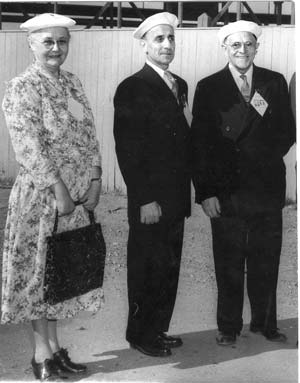 Mrs. Côté-Mercier, Gérard Mercier and Louis Even, in 1959
Mrs. Côté-Mercier, Gérard Mercier and Louis Even, in 1959In 1939, the founders were at L'Annonciation, in Labelle County, Quebec in the house rented by Mrs. Côté. People came to tell them that war had been declared in Europe. Louis Even began to cry. His answer was, “We will found a journal.” It was not the easiest decision because of war-time censorship of printed publications, including newspapers. But Louis Even was not a man to give up. VERS DEMAIN launched its first issue in September, 1939.
With the war, it was not easy to find a printer for a publication which denounced the banking system. Miss Côté went to see one printer and then a second. The second printer kept the text for 3 weeks before he refused to complete the job. Miss Côté went to see L'Eclaireur, from Beauceville who accepted the job and printed VERS DEMAIN for many years without reprisals.
The VERS DEMAIN office was in Mrs. Côté's home on St. Joseph's Boulevard. Miss Côté maintained the office, juggling answering the telephone and opening the mail between her apostolic ventures. In the 1st year, there were 6,000 subscribers to VERS DEMAIN; by the 2nd year the number soared to 25,000.
This was more than enough support to concern the pack of financiers who used their muscle to ensure influential leaders denounced the Social Credit ideas that were spreading like wildfire across the country.
The courage to continue the battle and regain the population's confidence was, fortunately, not in short supply.
 Gilberte Côté-Mercier in 1985
Gilberte Côté-Mercier in 1985In 1941, the founders launched an appeal to young people to join the movement on a full-time basis. Gérard Mercier, from St. Anne de Beaupre, who worked at St. Anne's Annals and headed the Youth Christian Workers, was the first to answer the call. He distinguished himself by his vigor and ardently supported the founders. He married Gilberte Côté on February 14, 1946. Gérard treated his wife with great respect and honour, recognizing the value of the person God had entrusted to him. The couple dedicated their entire lives to the movement.
The house on St. Joseph's Boulevard was no longer adequate to house the large-scale enterprise that VERS DEMAIN had become. Mrs. Côté sold the home and had another built at 4885 Chabot Street. The entire basement and half of the 2nd floor were reserved as offices for VERS DEMAIN. In the beginning, paid secretaries were employed. They were expected to dress modestly at work and all work stopped to pray the Rosary before dinner. One summer day, the employees arrived in immodest dress. Gilberte Côté fired them and her cousin, Juliette Lavigne, began work. In the 1950's, she sought the assistance of volunteers to the cause and Florentine Seguin and I [Therese Tardif] responded. We are still here [in 2020]!
Gilberte Côté gave fully of herself, never taking a vacation. She arranged the regional tours for full-time members and spent weekends on conference tours herself. She presented radio and television lectures each week and helped write and compile VERS DEMAIN. All problems within the movement were her domain. The telephone, next to her bed, was answered during the night should any apostle need help.
The police often persecuted or arrested apostles even though civil authorities knew we could disseminate our beliefs because in Canada freedoms of the press, expression and religion were protected by the Bill of Rights, and later, by the Canadian Charter of Rights and Freedoms. Even with these protections, our apostles were harassed, obliging Mrs. Côté-Mercier to deal with such matters.
Mrs. Côté-Mercier was uncompromising when it came to defending justice and the rights of the poor. She traveled across the provinces of Quebec, Ontario, New Brunswick and Western Canada, France, Switzerland, and Brazil to spread Social Credit. Essays written by her continue to be disseminated around the world.
In 1962, the movement's offices relocated from Montreal to Rougemont, with the construction of the House of St. Michael. On one particular day, the eve of Pentecost, 106 volunteers came to help with its construction. Mrs. Côté-Mercier, inspired by such dedication, said: “People will come from every country in the world to be enlightened in this house by Social Credit.”
In 1975, a second building, the House of the Immaculate was constructed with a large meeting room for our annual Congress and to house the men who were full-time Pilgrims.
Gilberte Côté did not waste her life in frivolity. She dedicated her youth to serious matters, such as serving the truth and defending justice. How many souls she brought back to the Church and onto the path to heaven!
Today's youth would do well to heed the examples of the lives of true heroes, like Gilberte Côté-Mercier. Such a study would bring youth back to the path of virtue and duty, qualities necessary to rebuild a ravaged civilization.
For us, those closest to her, we owe her thanks. She taught us how to dress like Christians; she protected us from the corruption of television. She offered an excellent example of devotion and service, love of God and of the poor. Thank you for having made of us apostles, soldiers of Christ and defenders of our fellow man, Gilberte!
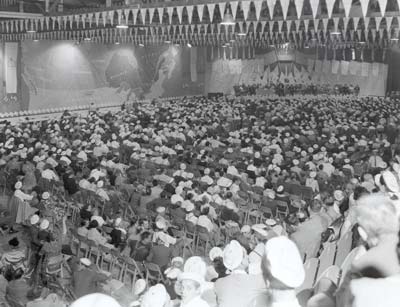
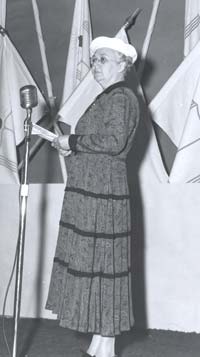
Gilberte Côté-Mercier addressed the assembled audience at the Quebec City Congress in 1955